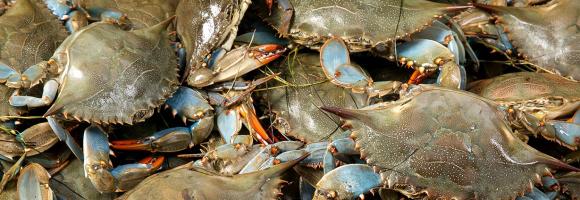 The good news is that the waters of the Chesapeake are getting progressively cleaner and the crab population has experienced a significant rebound. The bad news is that anti-immigrant politics have plunged the Chesapeake crabbing industry into chaos.
The good news is that the waters of the Chesapeake are getting progressively cleaner and the crab population has experienced a significant rebound. The bad news is that anti-immigrant politics have plunged the Chesapeake crabbing industry into chaos.
First, more on the good news. Last year, a study by the University of Maryland Center for Environmental Science reported that in 2016, Chesapeake Bay fisheries received an “A” for the health of the blue crab, anchovy and rockfish populations. Blue crabs scored 90 percent, improving drastically compared with two years ago, when the grade was 32 percent.
The really bad news is that despite the recovery of the crab fisheries, there is a dramatic shortage of workers to pick the meat sold in restaurants and supermarkets. The anti-immigrant policies of the current administration has resulted in 40% of the seasonal crab workers not receiving temporary visas to work in the Maryland crab processing plants.
As reported by the Washington Post:
[The Maryland seafood industry] … failed to get visas for their mostly Mexican workforce, including many women who have been coming north to Maryland for crab season for as long as two decades. The Trump administration for the first time awarded them this year in a lottery, instead of on a first-come, first-served basis.
Visa shortages have been a perennial issue for the crab industry since the last generations of Eastern Shore women who once picked crabmeat aged out of the tedious seasonal work. In the 1980s, crab houses started bringing workers from Mexico through a program that lets them live and work in the United States during the warmer months and then return to Mexico in the winter, when watermen are prohibited from crabbing. …
The crisis is hitting just as crab season begins. Watermen were allowed to start dropping crab pots into the Chesapeake and its tributaries on April 1, but with cold weather through the month, crabs were slow to emerge from hibernation. …
“Our families depend on us, and going to the United States is the best option because here in Mexico it is very difficult to find a job, and apart from that, you face the risk of so much crime,” Anayeni Chavarria Ponce, a crab picker from the Mexican state of Hidalgo, said via text message in Spanish. “Not to mention you can’t reach a salary even to buy the basics.”

Get non-working Americans to pick the crab meat… We do not need immigrants to further burden or bog down our social services. Period!
Norovirus outbreaks linked to BC oysters a sign of water pollution …
CBC.ca-16 hours ago
Oysters contaminated with norovirus in British Columbia have become a costly problem and the issue magnifies a broader failure to keep oceans clean, says the provincial shellfish growers association. Darlene Winterburn, the executive director of the B.C. Shellfish Growers Association, said the latest …
http://www.cbc.ca/news/canada/british-columbia/norovirus-oysters-april-2018-1.4649715
US joins Canada in investigation of outbreak linked to oysters
Food Safety News-Apr 30, 2018
“Most individuals who became sick reported eating raw oysters from the south and central parts of Baynes Sound, British Columbia, before the onset of their illness,” the Canadian agency reported. The investigation into a specific source of contamination impacting the shellfish farms in that area is ongoing.
http://www.foodsafetynews.com/2018/05/u-s-joins-canada-in-investigation-of-outbreak-linked-to-oysters/#.Wu3Y4IjRXcs
We are still a nation of immigrants even if the bigots are too dim to know their own history. Nd, by the way, these hard-working seasonal workers contribute to the economy and do nothing to “burden … our social services.”
Buyers too lazy or stupid to pick their own crab meat, just as bad as all the dried out (cooked) skinless chicken in the grocery store, want chicken with skin, buy a whole raw chicken.
With just me, what do I do with the rest, freeze it hard as rock, or toss it out?
As the blueberry growers here in Maine realized some 5 years ago. Its time to pay better wages if you want the job done at all.
All this anti-immigrant nonsense is going to do is to destroy US jobs and maritime culture. If US crab meat prices soar due to a lack of labor, we will see an influx Chinese and Venezuelan crab meat imports. The real cost of this blatant bigotry will be paid by the US crabbers whose boats will be laid up and whose crews will be unemployed.
Was it actually “immigrants” who picked the crab meat?
Or were they illegally here in the country?
When the “bracero act” was passed in 1942, a lot of white migrant families were put out of work, but it allowed seasonal workers from Mexico to help out with the U.S. labor shortage during the war.
The history of that act has been ever changing, but the intent was that workers were given work visas for seasonal work and then returned back across the Mexican border.
Somewhere, through time, the government began to ignore those who were not returning back across the border. They are here illegally.
If you want to support people who are here illegally, so be it. But I don’t think you can call them immigrants.
They should probably be called seasonal workers, although they are commonly referred to as immigrants in the media. They have been allowed in for decades to help with seasonal work. The recent crackdown on even those here legally has shut effectively shut them down.
And undocumented immigrants are indeed immigrants. For most of US history immigrants were effectively undocumented.